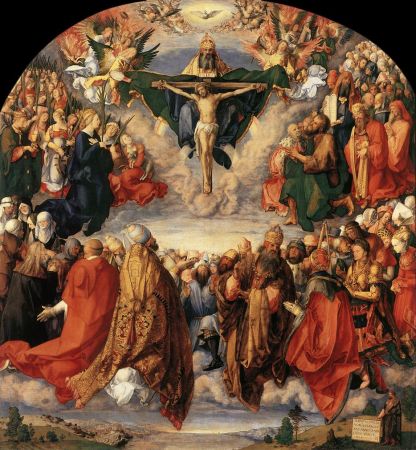Praise to Our Lord and Creator
After consulting the people, the king [Jehoshaphat] appointed singers to walk ahead of the army, singing to the Lord and praising him for his holy splendor. This is what they sang:Â “Give thanks to the Lord;Â his faithful love endures forever!”
2 Chron 20:21 NLT
King Jehoshaphat faced a great dilemma: three people groups from the other side of the Dead Sea have decided to target Jerusalem for capture. Jehoshaphat could call upon his troops, but he knows that they would be greatly outnumbered. Beyond all human logic Jehoshaphat rejects foreign alliances and the mobilization of the army. Instead, he calls on the tribe of Judah to pray, fast, and believe God.
Before all the people, Jehoshaphat prays and recalls God’s sovereign purposes, his covenant promises, and their current situation. As if on cue, a prophet declares God’s Word: “The battles is not yours, but God’s.” The command: “Do not fight, but worship. I will win your battle for you.” In short, worship me and I will win your warfare. The Lord calls Judah to trust by a faith that stands firm, stable, and firmly established in God. Judah believes God that he will bring the promised victory.
Indeed, God causes the three foreign armies to ambush themselves. Israel’s spoils are so numerous, it takes three days to gather all the stuff. God did not call Judah to win the battle, he called Judah to be available. God does not call us to be adequate, he has called us to be available instruments of his glory. God never calls us to something we can do, God only calls us to ministry that he can do in and through us.
Like Israel of old when we worship, we enter afresh into the victory of the Cross. Worship makes us available to God’s purposes. Worship acknowledges God’s greatness and exposes our neediness. Worship wins the warfare.
Worship takes place when we acknowledge that we are not the Creator, we bow our wills, and adore the eternal Lord. In worship, we recognize the infinite beauty of God, his unsurpassing love, and his omnipotent power as the God of the universe. In true worship, we submit our lives to his will, embrace his all-encompassing love, and trust his great goodness.
Worship is the submission of all our nature to God. It is the quickening of conscience by His holiness, the nourishment of the mind with His truth, the purifying of the imagination of His beauty, the opening of the heart to His love, the surrender of the will to His purpose.
William Temple
Worship is the love offering of our keen sense of the worth-ship of God. True worship springs from the same source as the missionary himself. To worship God truly is to become a missionary, because our worship is a testimony to Him. It is presenting back to God the best He has given to us, publicly not privately. Every act of worship is a public testimony, and is at once the most personally sacred and the most public act that God demands of His faithful ones.
Oswald Chambers, So Send I You: The Secret of the Burning Heart, electronic ed. (Hants UK: Marshall, Morgan & Scott, 1930), 149.
Worship is giving the best we have unreservedly to God.Â
Oswald Chambers, If Thou Wilt Be Perfect: Talks on Spiritual Philosophy (London: Marshall, Morgan & Scott, 1941), 79.
A basic outline of my sermon,“Jumpin’ Jehoshaphat,” is available in Google documents.








